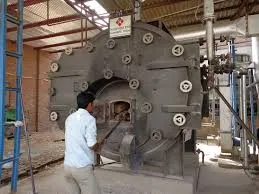
Sep . 14, 2024 21:02 Back to list
hot water boiler heating system
Hot Water Boiler Heating System An Overview
A hot water boiler heating system is an essential component of many residential and commercial heating setups, providing a reliable method for heating spaces during colder months. This system utilizes water as a heat transfer medium, making it an efficient choice for delivering warmth to various zones within a building.
At its core, a hot water boiler heating system consists of several key components the boiler itself, the piping system, radiators or underfloor heating elements, and the controls. The process begins when cold water enters the boiler, where it is heated by a fuel source such as natural gas, oil, or electricity. Once the water reaches the desired temperature, it is circulated through a network of pipes to distribute heat throughout the building.
One of the significant advantages of hot water boiler heating systems is their ability to maintain a consistent temperature. Unlike forced air systems, which can create drafts and uneven heating, hot water systems deliver a steady flow of warmth, creating a comfortable indoor environment. This uniform heating is particularly beneficial in larger spaces where maintaining consistent temperatures can be challenging.
Radiators are a common choice for distributing heat in hot water systems. These devices transfer heat from the hot water to the surrounding air, allowing for efficient temperature regulation. Some homeowners prefer underfloor heating systems, which involve a network of pipes installed beneath the floor. This method of heating provides comfort directly from the ground up, eliminating cold spots and reducing the reliance on traditional radiators.
hot water boiler heating system

In addition to providing comfort, hot water boiler heating systems also offer energy efficiency. Modern boilers are designed to maximize fuel utilization, reducing operational costs. Many systems now incorporate advanced technologies such as condensing boilers, which capture and reuse heat that would otherwise be lost in the flue gases. This innovation not only helps lower energy bills but also minimizes environmental impact.
Control systems play a crucial role in managing hot water boiler heating systems. Thermostats and programmable controls enable users to set specific temperature preferences, ensuring that the system operates efficiently. Smart thermostats can even adapt to users' behaviors, further optimizing energy consumption and enhancing comfort.
Regular maintenance is essential to keep hot water boiler systems running smoothly. Routine inspections and servicing help identify potential issues before they escalate, ensuring the system remains efficient and extending its lifespan. Homeowners should consider scheduling annual maintenance performed by qualified technicians to ensure peak performance.
In conclusion, hot water boiler heating systems represent an effective and efficient solution for residential and commercial heating needs. Their ability to provide consistent warmth, energy efficiency, and comfort makes them a popular choice among property owners. With proper maintenance and modern controls, these systems can offer reliable heating for many years, contributing to a cozy and inviting living environment.
-
High-Efficiency Commercial Oil Fired Steam Boiler for Industry
NewsJul.30,2025
-
High-Efficiency Biomass Fired Thermal Oil Boiler Solutions
NewsJul.30,2025
-
High Efficiency Gas Fired Thermal Oil Boiler for Industrial Heating
NewsJul.29,2025
-
High-Efficiency Gas Fired Hot Water Boiler for Sale – Reliable & Affordable
NewsJul.29,2025
-
High Efficiency Biomass Fired Hot Water Boiler for Industrial and Commercial Use
NewsJul.29,2025
-
High-Efficiency Biomass Fired Hot Water Boiler for Industrial Use
NewsJul.28,2025
Related PRODUCTS






















